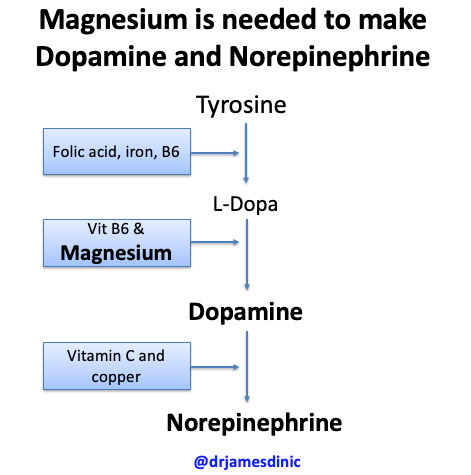This article was previously published June 4, 2020, and has been updated with new information.
The recent coronavirus pandemic has infected over 5 million people and has caused over 300,000 deaths. This pandemic has also caused school and business closings, social distancing, and has forced millions of people to be confined to their homes.
Social confinement can lead to feelings of anxiety, stress and depressed mood, and this can lead to other negative health consequences. Although people can exercise and seek counseling, nutrients can make a difference with the most important one being magnesium.
Approximately 50% of American adults are not getting the estimated average requirement for magnesium (around 400 mg of magnesium/day).1 Indeed, most Americans are only consuming around 250 mg of magnesium per day.2
Thus, a substantial percent of the population is likely magnesium deficient and may benefit by taking an additional 150 to 200 mg of magnesium through supplementation.
In fact, up to 30% of the population is magnesium deficient based on low serum magnesium levels, and up to 84% of certain patient populations are magnesium deficient when using the gold standard IV magnesium load test.3
Thus, subclinical magnesium deficiency is common and leads to numerous mental health issues. This brief review will cover the potential benefits of magnesium, particularly magnesium L-threonate, for mood and anxiety.
Magnesium L-Threonate to the Rescue
Symptoms of magnesium deficiency can include many mental issues such as depression, confusion and agitation.4 Individuals with depression are known to have
- Lower magnesium levels in the blood5 and the brain.6
- Low cerebral spinal fluid magnesium.7
Unfortunately, cerebral spinal fluid magnesium levels are tightly controlled, whereby boosting blood levels of magnesium by 300% only increases cerebrospinal fluid levels by approximately 10 to 19%.8 However:
- Magnesium L-threonate has improved effectiveness for increasing cerebrospinal fluid magnesium levels.9
- Only magnesium L-threonate, as opposed to magnesium chloride or magnesium gluconate, increases cerebrospinal fluid magnesium levels and improves cognition in animal models.10
The first report of magnesium for improving mood was published in 1921, showing success in 220 out of 250 cases.11 Since then, numerous case reports have found rapid improvements in mood with the use of magnesium supplementation without side effects.12 Additionally:
- A randomized equivalent trial found that oral magnesium supplementation was just as effective as an antidepressant for improving mood.13
Thus, clinical studies in humans suggests that magnesium supplementation is beneficial for improving mood. Approximately 60% of individuals who have a depressed mood are considered treatment-resistant and this may be due to magnesium deficiency.14 Moreover:
- Low magnesium levels correlate with poor outcomes in individuals with a depressed mood who do not respond to medications.15
- Higher magnesium intakes are associated with better mood scores.16
- All of this suggests a potential role for magnesium, especially magnesium L-threonate, for mental health.
In summary, depressed mood may simply be a sign of magnesium deficiency in the brain. Boosting brain magnesium levels, particularly with the use of magnesium L-threonate, may have profound benefits on mood.
Importantly, magnesium is needed to make the three primary neurotransmitters in the brain, i.e., serotonin, dopamine and noradrenaline and melatonin, which is important for sleep.


Magnesium L-Threonate for Anxiety Support
High levels of stress can lead to magnesium deficiency by increasing the amount of magnesium that is lost in the urine.17,18 |
Moreover, magnesium deficiency enhances the stress response.19 |
Magnesium deficiency increases stress-induced mortality in animals,20 whereas compensation for magnesium deficiency improves the ability of the nervous system to resist stress.21 |
In other words, stress leads to magnesium deficiency and magnesium deficiency leads to stress. |
Animals receiving diets low in magnesium display increased anxiety-related behavior,22 and this may be due to hyper-excitability in the brain and increased cortisol production.23 |
Importantly, two studies have shown that supplementing animals with magnesium L-threonate reduces anxiety.24,25 |
Thus, magnesium L-threonate may have a central role in anxiety support. In summary, anxiety can cause magnesium deficiency and vice versa. Considering that most people in the United States are not consuming an adequate amount of magnesium from the diet, supplementation with magnesium L-threonate may have an important role for anxiety support.
